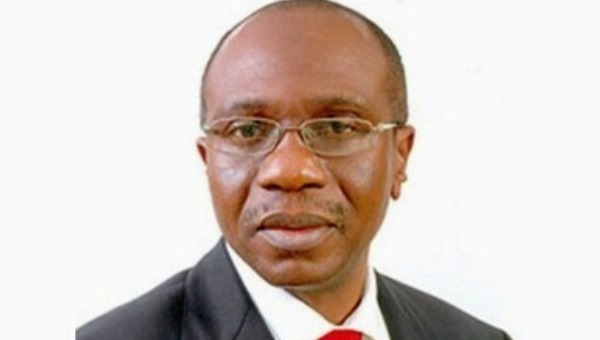Mr Godwin Emefiele, Central Bank of Nigeria (CBN) Governor, yesterday, officially flagged off the Tertiary Institutions Entrepreneurship Scheme (TIES), an intervention of the apex bank aimed at frontally tackling the dual challenge of youth unemployment and underemployment in Nigeria.

Also inaugurated was the Body of Experts (BoE) for the scheme, which was developed in partnership with Nigerian polytechnics and universities.
TIES was designed to harness the potential of graduate entrepreneurs by creating a paradigm shift from the pursuit of white-collar jobs to a culture of entrepreneurship for economic development and job creation.
Speaking at the event, the CBN Governor noted that six start-up firms in various endeavours emerged the pioneer beneficiaries of N5 million loan facility each, which they will plough into their businesses to expand them, generate more income and employ more people.
The CBN Governor added that with about 600,000 students graduating yearly from Nigerian tertiary institutions, and without the commensurate employment opportunities in both the public and private sectors, it has become imperative that government, at all levels, puts in place policy measures to support entrepreneurial development among the youth.
“Such measures would create an enabling business ecosystem that supports innovation and enables the youth to unleash their entrepreneurial potential, by redirecting their focus from seeking white-collar jobs to a culture of entrepreneurship development.
“The ecosystem should provide support in re-orientating, training, and providing a financing model apt to the peculiarity of the sector within which the businesses operate”, he explained.
Emefiele, while describing entrepreneurship as an integral part of any economy, assured that the apex bank, on his watch, will keep introducing and sustaining several programmes that create an ecosystem that allows the flow of affordable credit to the real sector.
He noted that Nigeria, with an estimated population of 213 million, out of which two-thirds are youth, aged under 35 years, the nation was faced with a historic opportunity, particularly as the demography continues to create clear evidence of their relevance to economic development, as accentuated by the global recognition of Nigerian tech start-ups and continued growth of businesses in the technology space owned by the youth.
Emefiele further explained that the scheme was designed to address three verticals of the segment, which are; the term loan component that provides direct credit opportunities to graduates of Nigerian polytechnics and universities of not more than seven years post-graduation.
“An applicant, if successful, shall be eligible for a maximum of ₦5 million for an individual, sole-proprietorship or small company; and a maximum of ₦25 million for a partnership or company. The tenor for the facility is maximum of five years, with a one-year moratorium, and at an interest of 5 per cent per annum, which shall revert to 9 per cent from March 2022.
“The pilot phase of the Scheme is presently being implemented through the Bank of Industry (BOI) with the development of an application portal and processing of submitted applications.
“The Equity Investment Component – is designed to support start-ups, existing businesses requiring expansion, and ailing businesses seeking resuscitation. The Component shall be implemented under the Bank’s AgSMEIS Equity Window. Thus, the investment limit shall be subject to the limit prescribed by the AGSMEIS Guidelines and the investment period not more than 10 years.
“The Developmental Grant Component is aimed at raising awareness and visibility of entrepreneurship among undergraduates of Nigerian tertiary institutions.
Here, polytechnics and universities in Nigeria shall compete in a national biennial entrepreneurship competition where undergraduates are presented by the tertiary institutions to pitch innovative entrepreneurial or technological ideas with transformational potential.
“Three top institutions at the regional levels shall proceed to the national level, where the top five shall be awarded grants ranging between ₦120 million and ₦250 million. It is instructive to note that grant awards shall be used by the tertiary institutions solely for the development of the award-willing ideas”, he added.
For the Body of Experts, Emefiele listed an 11-member committee with Mr. Abubakar Suleiman of Sterling Bank Plc as the Chairman, while the Secretary is Mrs. Temitope Akin-Fadeyi of the CBN.
Members include;Mr. Patrick Iyamabo of First Bank Plc; Mr. Adamu Lawani (Zenith Bank Plc); Ms. Ngover Ihyembe-Nwankwo (Rand Merchant Bank); Mr. Ashafa Ladan (National University Commission), Engr. Abbati D.K. Muhammad (National Board for Technical Education; Dr. Friday Okpara (SMEDAN); Mr. Tope Fasua (Global Analytics Consulting); -Brigadier-General Folusho Oyinlola (National Defence College); and Ms. Bolanle Adekoya (PWC).
The first five beneficiaries of N5 million facility are; Aisha Suleiman; Chukwudi Ukpabi; Zainab Mohammed; Nura Muhammed; Simeon Ojonugba and Adebowale Adeoye.
Emefiele while urging them to work harder in their respective endeavours, said then apex bank will continue to support youths entrepreneurship.
He listed some intervention programmes to include; Targeted Credit Facility (TCF), where the bank has disbursed a total of ₦363.49 billion to 766,719 beneficiaries, comprising 638,070 households and 128, 649 small businesses.
Under its Agribusiness Small and Medium Enterprise Investment Scheme (AgSMEIS), the Bank has released ₦134.63 billion to 37,571 entrepreneurs. Disbursements under the NYIF stood at ₦3.00 billion to 7,057 small business beneficiaries.
“I would like to urge the recipients of these loans to judiciously utilize the funds for the purpose for which they had indicated in their applications. It is my strong belief that the Scheme will offer our youth entrepreneurs access to much needed finance, which has been identified as one of the major limiting factors to entrepreneurship development in Nigeria.
“We are aware that there have been agitations by some tertiary institutions that were not included in the pilot phase of the Scheme. Let me reiterate here that with the launch of the Tertiary Institutions Entrepreneurship Scheme today, other deserving tertiary institutions will be brought on board over time.
“With ongoing dialogue and engagements with other segments of the educational sector, feedbacks received shall form the basis for the periodic review of the guidelines, with the intent to scale up participation under the Scheme in future.
“Let me restate the Central Bank of Nigeria’s total and unrelenting commitment to supporting the country’s educational sector in all ramifications, as without a robust educational sector wholesome development shall remain a mirage.
“I believe with the launch of the Tertiary Institutions Entrepreneurship Scheme, and other programmes such as this, it is only a matter of time before our tertiary institutions return to the glory days, where they churned out graduates, not only ready and able to provide real solutions to the various challenges emanating from their immediate environment and even beyond, but who can compete favourably with their counterparts around the world” Emefiele stated.

















































